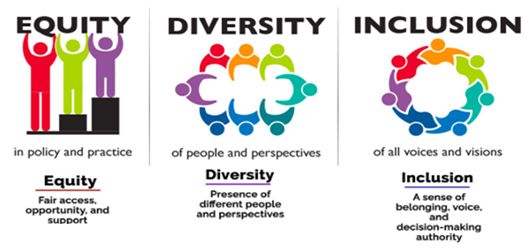Introduction:
Employees want to feel recognized, valued, and appreciated, with a sense of belonging where they work, regardless of their background. This underscores the necessity of ensuring Equity, Diversity, and Inclusion (EDI) in any employment scenario including at law firms.
Globally, the principles of Equality/Equity, Diversity and Inclusion (EDI) are essential guidelines for creating a more equitable, just, and harmonious society. These values transcend common notions; they represent a dedication to acknowledging and celebrating each person's distinctive qualities, irrespective of their color, ethnicity, gender, age, sexual orientation, talents, or any other defining factor(s).
Management's applied EDI policies and practices in daily activities in the office spaces, having an unbiassed, positive-thinking and acceptable work environment is currently something that most law firms struggle to achieve. Presently, the issue of understanding why EDI in law firms is important has attracted more attention across the world. Management in most law firms are aware of the importance of ensuring staff understand how to contribute to an inclusive office and the positive impact it has on every aspect of the business.
However, there is great need for staff to understand the policies of EDI as primarily demonstrated through their interaction with others. Thus, it is very important for both staff and management to work together and learn from each other, as well as implement effective diversity management practices. The effective implementation of EDI policies is essential for law firms and should be reinforced annually to ensure all staff are familiar with such policies and practices.
Definition of Equality, Diversity and Inclusion
- Equality: This refers to ensuring fairness to all members of staff without discrimination, ensuring staff or group of staff are not treated less favourably. Equality can also be regarded as equality of opportunity, not isolating and making staff redundant while others were active and productive at work but ensuring that every individual staff, including those with physical challenges are all given the necessary work tools and equipment needed to excel at work.
- Thus, equality/equity ensures that the notion of fairness and justice is assured and experienced by all staff across the board. It seeks to eliminate systemic biases and barriers that may hinder any staff's access to available resources, opportunities, and privileges.
- Diversity: This is about recognizing, respecting, and celebrating individual staff's peculiarities in terms of skin color, ethnicity, abilities, age, gender, beliefs, interests, marital or partnership status, geographic, academic/professional backgrounds, opinions, circumstances, and experiences.
- Diversity identifies that staff may differ in a wide range of obvious and subtle ways, but these differences should be acknowledged, appreciated, cherished, and encouraged. A diverse law firm encompasses a broad background of experiences and perspectives, which promotes innovation and creativity amongst staff within a law firm.
- This principle recognizes and embraces the rich tapestry of differences among personalities. Law firms practicing diversity acknowledges the fact that the world is a mosaic of varied backgrounds, experiences, and perspectives.
- Inclusion: It is an active process of ensuring that all individuals are welcomed, respected, and valued for their differences regardless of background or other traits. it is about creating environments where everyone feels they can contribute and thrive whilst working towards the objectives of the law firm. Inclusion encourages staff to display their true selves which fosters a sense of belonging.
- Thus, an inclusive law firm1 culture is one in which staff are equally accepted for who they are and which values the need to create a safe and protected work environment. Their contributions and services rendered by employees towards the growth and achievement of set goals and objectives of the law firm matter and should be valued. In return the law firm's policies and practices must be fair and supportive enough for a diverse range of employees to work together effectively and in harmony.

Diagram of Equity
Diversity and Inclusion in a law firm2
at
https://openoregon.pressbooks.pub/dothework/chapter/1-2-diversity-equity-and-inclusion
and also at3
https://nursology.net/2022/08/30/lived-experiences-on-issues-related-to-diversity-equity-and-inclusion-based-on-theory-of-humility/
Benefits of Equality, Diversity, and Inclusion in law firms
EDI policies are primarily illustrated through interaction with others. Therefore, it is very necessary for both staff and management to take time to understand the impact of EDI across features of a law firm's policy framework. EDI implementation is essential for law firm's activities and should be reinforced at regular intervals depending on the convenience of the Law firm to ensure all staff are familiar with the best practices.
The following are the importance of EDI in a law firm
- It Promotes Healthy Interaction amongst Staff: Equality, diversity, and inclusion are not just abstract concepts but are demonstrated through everyday interactions among staff. Using this approach, both staff and management collaborate to learn from each other, tolerate each other and implement effective diversity law firm practices.
- It Enhances Problem-Solving: In a law firm where EDI principles are allowed and practiced, this gives room for mixed/joint perspectives, and the staff are more likely to contribute towards finding more effective and comprehensive solutions to challenges.
- It Fosters Healthy Work Environments: Law firms that practice an inclusive approach are more likely to be free from discrimination, leading to lower stress, healthier work-life balance, strong mental health and friendly, family-like working environment.
- Enhances Innovation and Creativity: Diversity in the law firms brings together employees with different perspectives and experiences, fostering creativity and innovation.
- It Promotes Equality: In a law firm where a parity approach is practiced, and everyone is included and respected, advances social justice and equality.
- It Enhances Resilience: Since staff are treated equally and given same opportunity to carry out their respective roles in the law firms, there is often more resilience in the face of challenges which can stimulate quick recovery from setbacks.
- It Enhances Skill Diversity: A diverse law firm brings a range of skills and experiences to the table. Hiring people from different backgrounds increases the likelihood of finding candidates with unique talents and expertise, enriching the team's skill output.
- It allows for Discovery of Talent: Embracing diversity attracts a wide pool of candidates, including those with hidden talents or unconventional backgrounds. This diversity in talent can lead to unexpected discoveries and contributions to the company's success. Companies that are committed to diversity and inclusion are more likely to attract top-tier talent.
- It Boosts productivity and gives room for better Understanding of Market Dynamics: A diverse employee base with a broader range of perspectives, enables businesses to better understand and connect with diverse markets and consumer demographics. It attracts positive attention of the market to the law firm's brand, products and services. This insight can inform marketing strategies and product development to meet consumer needs. However, diverse teams work more efficiently and produce higher quality results, thus, market and customer demands are reached and satisfied.
- It Enhances Company Reputation: Law firms that practice equality, diversity and inclusion are attractive to job seekers and investors because of the goodwill and positive reputation it exudes in the media. This is a marketing and publicity feature that positions the company as an employer of choice.
- It Improves Performance Standards: Law firms where staff feel valued and included in the daily activities and affairs of the business make them motivated to perform at their best. A culture of equality, diversity, and inclusion fosters a sense of belonging and commitment, leading to higher productivity and performance standards. Staff are more likely to stay with a company that prioritizes equality and offers equal opportunities for growth and advancement.
Conclusion
In a nutshell, promoting equality, diversity, and inclusion in law firms is not only the right thing to do ethically but it is hugely beneficial to a law firm's success in areas of staff satisfaction and risk management.
Law firms where fairness and justice are practiced must be built on equal possibilities. Management contributes to ensuring that every employee, irrespective of background or personal circumstances, has an equal opportunity to succeed.
Notably, inclusivity and diversity in the law firms are fostered by equal opportunity. This implies that several opinions and ideas are acknowledged and expressed, which helps to improve decision-making and problem-solving capacity. When employees with various experiences and backgrounds collaborate, it brings fresh ideas that result in more innovative and lasting solutions.
Footnotes
1. See, https://www.cipd.org/en/knowledge/factsheets/diversity-factsheet/#Whatis accessed on 30th May 2024.
2. Available at https://nursology.net/2022/08/30/lived-experiences-on-issues-related-to-diversity-equity-and-inclusion-based-on-theory-of-humility/ and https://openoregon.pressbooks.pub/dothework/chapter/1-2-diversity-equity-and-inclusion/ accessed on 30th May 2024.
3. See, https://independentsector.org/resource/why-diversity-equity-and-inclusion-matter/ accessed on 24th June 2024.
The content of this article is intended to provide a general guide to the subject matter. Specialist advice should be sought about your specific circumstances.


